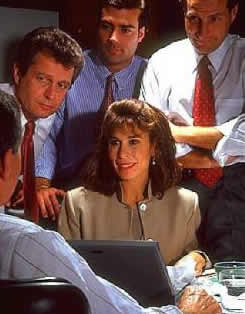| |
|
|
Passage
G
|
Who is Reading
Your E-mail?
|
|
The
right to privacy is so fundamental to citizenship that you might assume your
private phone calls and e-mail while at work are protected by
law from snooping
eyes and ears. But you would be wrong.
is so fundamental to citizenship that you might assume your
private phone calls and e-mail while at work are protected by
law from snooping
eyes and ears. But you would be wrong.
One court case underlining the vulnerability of employees
involved Epson America, Inc. The California-based company's
e-mail system was coordinated by a woman named Alana Shoars,
who advised her colleagues that their passwords and communications
were private and secure.
Shoars later discovered a company executive was reading employees'
electronic messages. She confronted him, and after being fired,
Shoars sued Epson for wrongful discharge, slander and invasion
of privacy. But Epson, like other employers, insisted that since
it owned the e-mail system, it had the right to control it and
monitor its use.
In a similar case, an executive at Pillabury came across a
printout of a private message from Michael Smyth to his immediate
supervisor, stating that their bosses were "back-stabbing
bastards."
Pillsbury promptly fired Smyth. He sued for wrong discharge,
claiming he'd been promised that his electronic communications
would be private-a claim Pillsbury denied. In January 1996 a
federal judge threw out his case, ruling that even if the company
had promised that the messages were confidential, the "defendant's
actions did not tortiously invade the plaintiff's privacy."
Privacy in the workplace is a relative concept. In a 1996
University of Illinois survey of 84 Fortune 500 companies, 75
percent said they collected personal information about employees,
and the vast majority acknowledged that they shared the information
with the government agencies and creditors. Two-thirds of
these corporations even admitted hiring private investigators
to gather information about employees' private lives.
Under federal law it is not illegal to gather highly personal
information about employees. Your boss can monitor your family
life, check on your membership in various organizations, read
your credit reporters, do background checks on your personality
traits and education and even, in certain instances, delve into
your medical history.
Employers can listen in on your phone calls and voice mail.
They can read your e-mail --- even if your message is marked
"private." They can monitor what is on your computer's
screen and hard drive.
While public employees enjoy some minimal Fourth Amendment
protections against unreasonable searches and seizures by government
employers, federal law provides little protection to workers
in the private sector. "When most Americans go to work
in the morning, they might as well be going to a foreign country,"
says Lewis Maltby of the American Civil Liberties Union's Workplace
Rights Project, "because they are equally beyond the reach
of the Constitution in both situations."
In the 1970s Congress created a special commission to examine
the issue of employee privacy. The commission ultimately recommended
that companies be allowed to develop their own voluntary policies.
Commission chairman David F. Linowes, a professor at the University
of Illinois, conducted fellow-up studies to determine how well
business has done in protecting employees' privacy. His conclusion:
voluntary regulation has been a dismal failure. Not only do
businesses continue to collect detailed and highly personal
information, but " the amount of unsubstantiated and
irrelevant information that finds its way into files is amazing,"
he complains. "Rumors, poison-pen letters, things that
appeared in newspapers. We found many errors that resulted in
terrible abuse. Employees should be allowed to correct errors,
but 24 percent of companies do not allow corrections."
The personal file of one Chicago woman included grade school
report cards and evaluations
from her third-grade teacher, including a note describing the
woman's mother as "crazy." That note reportedly led
her employer to question the woman's own mental soundness. "
With information being transmitted across the country and abroad
at the speed of light," notes Linowes, "an error in
one record can be propagated a hundredfold instantaneously."
(630 words)
|
|
|
|
|
|
|